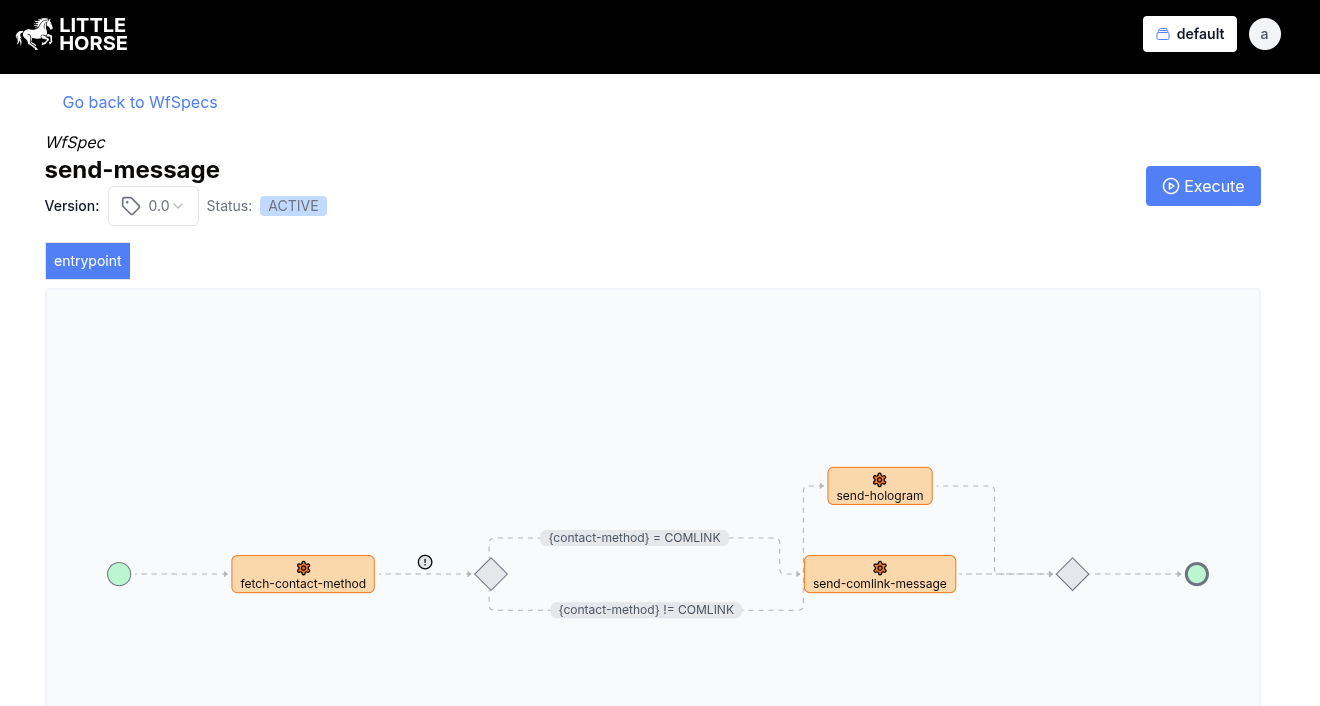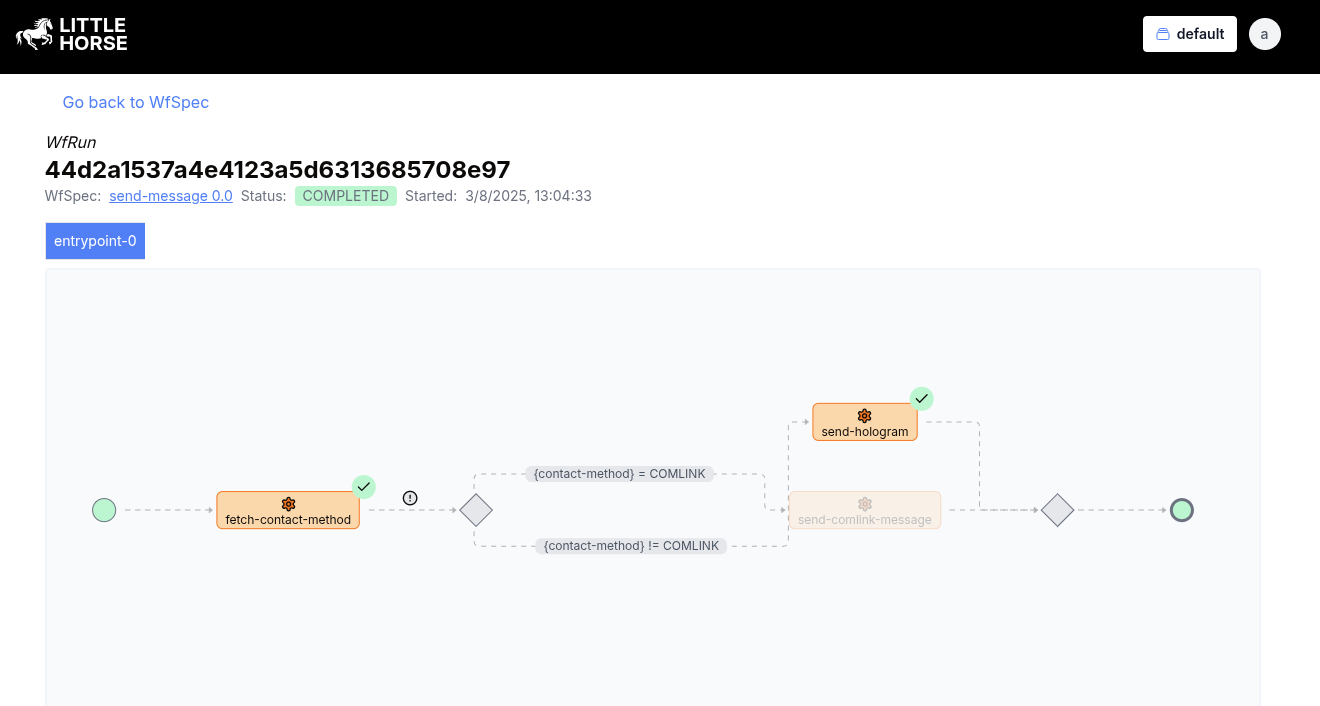Conditionals
Programming languages conditional branching (like if/else statements) to allow your programs to respond to different inputs. In a LittleHorse WfSpec, conditional branching serves an identical purpose.
Basic Concepts
LittleHorse Conditionals work almost exactly like if does in most programming languages. Depending on whether an expression evaluates to true or false, a block of logic (code or WfSpec) is either executed or not.
Workflow Conditions
The WorkflowCondition in the LittleHorse DSL is analogous to the "thing" that goes between the parentheses in your if () statements (or just after the if in Python and GoLang). LittleHorse WorkflowConditions evaluate at runtime to true or false.
Under the hood (at the protobuf level), a WorkflowCondition consists of three parts:
- The Left-Hand-Side (LHS),
- The
Comparator, - and the Right-Hand-Side (RHS).
The LHS and the RHS can be anything: a Variable in a WfRun, a constant, a handle to the output of a previous node (eg. a TaskRun output or an ExternalEvent payload), or a complex Expression.
The Comparator compares the LHS and the RHS. LittleHorse supports the following comparisons:
LESS_THAN, which returns true if the LHS is<the RHS.GREATER_THAN, which returns true if the LHS is>the RHS.LESS_THAN_EQ, which returns true if the LHS is<=the RHS.GREATER_THAN_EQ, which returns true if the LHS is>=the RHS.EQUALS, which returns true if the LHS is==the RHS.NOT_EQUALS, which returns true if the LHS is!=the RHS.IN, which returns true if the LHS is==one of the elements in the RHS (if the RHS is aJSON_ARRvariable) or if the LHS is==one of the keys in the RHS (if the RHS is aJSON_OBJvariable).NOT_IN, which is the opposite ofIN.
You can find a detailed description of them in the protobuf documentation.
DoIf, DoIfElse, and DoWhile
In all of our SDK's, the WorkflowThread has a few methods that let you work with conditionals. Each method takes in a WorkflowCondition and one or more ThreadFuncs, which are lambda functions or function pointers that define workflow logic when given a WorkflowThread:
WorkflowThread#doIf(), which takes in aWorkflowConditionand a workflow logic body (a lambda function). The resultingWfSpecexecutes the logic in the lambda if theWorkflowConditionevaluates totrueat runtime.WorkflowThread#doIfElse(), which takes in aWorkflowConditionand two logic bodies. The resultingWfSpecexecutes the first body if the condition evaluates totrueand the second one if the condition evaluates tofalse.WorkflowThread#doWhile(), which takes in aWorkflowConditionand a workflow logic body. It behaves exactly likewhile (someCondition) {/* */}in programming languaes: the logic body is executed repeatedly so long as the condition keeps evaluating totrue.
In Practice
Let's see conditionals used in a practical example.
Creating the WfSpec
We'll write a WfSpec (similar to the example in the Variables Concepts page), which:
- Takes in a
user-idand amessageto send as input. - Fetches the user's preferred contact method.
- If the user prefers contact via hologram, it sends them a hologram; otherwise, it sends them the message through their Comlink.
Background: The Tasks
This example will need three TaskDefs. There isn't any new magic here, so for the sake of brevity here is the code:
- Java
- Python
- Go
- C#
package io.littlehorse.quickstart;
import java.util.List;
import io.littlehorse.sdk.common.config.LHConfig;
import io.littlehorse.sdk.worker.LHTaskMethod;
import io.littlehorse.sdk.worker.LHTaskWorker;
class MyTasks {
// This Task Method returns a POJO, which is automatically serialized to a JSON_OBJ variable
// value in LittleHorse.
@LHTaskMethod("fetch-contact-method")
public String fetchUser(String userId) {
if (List.of("obiwan", "padme", "satine").contains(userId)) {
return "COMLINK";
} else {
return "HOLOGRAM";
}
}
@LHTaskMethod("send-comlink-message")
public String sendComlink(String userId, String message) {
String result = "sent comlink " + message + " to user " + userId;
System.out.println(result);
return result;
}
@LHTaskMethod("send-hologram")
public String sendHologram(String userId, String message) {
String result = "sent hologram " + message + " to user " + userId;
System.out.println(result);
return result;
}
}
public class Main {
public static void main(String[] args) throws Exception {
LHConfig config = new LHConfig();
MyTasks taskFuncs = new MyTasks();
LHTaskWorker contactMethodService = new LHTaskWorker(taskFuncs, "fetch-contact-method", config);
LHTaskWorker comlinkService = new LHTaskWorker(taskFuncs, "send-comlink-message", config);
LHTaskWorker hologramService = new LHTaskWorker(taskFuncs, "send-hologram", config);
hologramService.registerTaskDef();
contactMethodService.registerTaskDef();
comlinkService.registerTaskDef();
Runtime.getRuntime().addShutdownHook(new Thread(hologramService::close));
Runtime.getRuntime().addShutdownHook(new Thread(contactMethodService::close));
Runtime.getRuntime().addShutdownHook(new Thread(comlinkService::close));
hologramService.start();
contactMethodService.start();
comlinkService.start();
}
}
import asyncio
import littlehorse
from littlehorse import create_task_def
from littlehorse.worker import LHTaskWorker
from littlehorse.config import LHConfig
config = LHConfig()
async def fetch_user(user_id: str) -> str:
if user_id in ["obiwan", "padme", "satine"]:
return "COMLINK"
else:
return "HOLOGRAM"
async def send_comlink(user_id: str, message: str) -> str:
result = "sent comlink " + message + " to user " + user_id
print(result)
return result
async def send_hologram(user_id: str, message: str) -> str:
result = "sent hologram " + message + " to user " + user_id
print(result)
return result
async def main():
workers = [
LHTaskWorker(fetch_user, "fetch-user", config),
LHTaskWorker(send_comlink, "send-comlink", config),
LHTaskWorker(send_hologram, "send-hologram", config)
]
await littlehorse.start(*workers)
if __name__ == "__main__":
create_task_def(fetch_user, "fetch-user", config)
create_task_def(send_comlink, "send-comlink", config)
create_task_def(send_hologram, "send-hologram", config)
asyncio.run(main())
import (
"fmt"
"slices"
"github.com/littlehorse-enterprises/littlehorse/sdk-go/littlehorse"
)
func FetchUser(userId string) string {
if slices.Contains([]string{"obiwan", "padme", "satine"}, userId) {
return "COMLINK"
} else {
return "HOLOGRAM"
}
}
func SendComLink(userId string, message string) string {
result := "sent comlink " + message + " to user " + userId
fmt.Println(result)
return result
}
func SendHologram(userId string, message string) string {
result := "sent hologram " + message + " to user " + userId
fmt.Println(result)
return result
}
func main() {
config := littlehorse.NewConfigFromEnv()
contactMethodService, _ := littlehorse.NewTaskWorker(config, FetchUser, "fetch-contact-method")
comlinkService, _ := littlehorse.NewTaskWorker(config, SendComLink, "send-comlink-message")
hologramService, _ := littlehorse.NewTaskWorker(config, SendHologram, "send-hologram")
//Register TaskDef
contactMethodService.RegisterTaskDef()
comlinkService.RegisterTaskDef()
hologramService.RegisterTaskDef()
//Start Task Worker
go func() {
contactMethodService.Start()
}()
go func() {
comlinkService.Start()
}()
go func() {
hologramService.Start()
}()
select{}
}
using LittleHorse.Sdk;
using LittleHorse.Sdk.Worker;
namespace Quickstart;
public class MyTasks
{
// This Task Method returns a POJO, which is automatically serialized to a JSON_OBJ variable
// value in LittleHorse.
[LHTaskMethod("fetch-contact-method")]
public string FetchUser(string userId)
{
var userIds = new List<string>{"obiwan", "padme", "satine"};
if (userIds.Contains(userId))
{
return "COMLINK";
}
return "HOLOGRAM";
}
[LHTaskMethod("send-comlink-message")]
public string SendComlink(string userId, string message)
{
string result = $"sent comlink {message} to user {userId}";
Console.WriteLine(result);
return result;
}
[LHTaskMethod("send-hologram")]
public string SendHologram(string userId, string message)
{
string result = $"sent hologram {message} to user {userId}";
Console.WriteLine(result);
return result;
}
}
public abstract class Program
{
static void Main(string[] args)
{
var config = new LHConfig();
MyTasks taskFuncs = new MyTasks();
LHTaskWorker<MyTasks> contactMethodService =
new LHTaskWorker<MyTasks>(taskFuncs, "fetch-contact-method", config);
LHTaskWorker<MyTasks> comLinkService =
new LHTaskWorker<MyTasks>(taskFuncs, "send-comlink-message", config);
LHTaskWorker<MyTasks> hologramService =
new LHTaskWorker<MyTasks>(taskFuncs, "send-hologram", config);
contactMethodService.RegisterTaskDef();
comLinkService.RegisterTaskDef();
hologramService.RegisterTaskDef();
AppDomain.CurrentDomain.ProcessExit += (sender, e) =>
{
// Close processes gracefully, for each one does a call to the server, and it could be some disconnections.
contactMethodService.Close();
comLinkService.Close();
hologramService.Close();
};
contactMethodService.Start();
comLinkService.Start();
hologramService.Start();
}
}
The WfSpec
This is where the magic happens. We will use the doIfElse() method.
- Java
- Python
- Go
- C#
package io.littlehorse.quickstart;
import io.littlehorse.sdk.common.config.LHConfig;
import io.littlehorse.sdk.wfsdk.WfRunVariable;
import io.littlehorse.sdk.wfsdk.Workflow;
import io.littlehorse.sdk.wfsdk.WorkflowThread;
public class Main {
public static final String WFSPEC_NAME = "send-message";
public static void wfLogic(WorkflowThread wf) {
WfRunVariable userId = wf.declareStr("user-id").required();
WfRunVariable message = wf.declareStr("message").required();
WfRunVariable preferredContact = wf.declareStr("contact-method");
// Fetch + save the preferred contact method
preferredContact.assign(wf.execute("fetch-contact-method", userId));
wf.doIfElse(preferredContact.isEqualTo("COMLINK"), ifHandler -> {
// It is CRUCIAL here to use `ifHandler`, not `wf`.
ifHandler.execute("send-comlink-message", userId, message);
// Feel free to add more logic in here.
}, elseHandler -> {
elseHandler.execute("send-hologram", userId, message);
});
}
public static void main(String[] args) throws Exception {
LHConfig config = new LHConfig();
Workflow wfGenerator = Workflow.newWorkflow(WFSPEC_NAME, Main::wfLogic);
wfGenerator.registerWfSpec(config.getBlockingStub());
}
}
from littlehorse.config import LHConfig
from littlehorse.workflow import WorkflowThread, Workflow
from littlehorse import create_workflow_spec
def get_workflow() -> Workflow:
def wfLogic(wf: WorkflowThread) -> None:
user_id = wf.declare_str("user-id").required()
message = wf.declare_str("message").required()
preferred_contact = wf.declare_str("contact-method")
#Fetch + store the preferred contact method
preferred_contact.assign(wf.execute("fetch-contact-method", user_id))
wf.do_if(preferred_contact.is_equal_to("COMLINK"),
#it is CRUCIAL to use 'ifHandler' here, not 'wf'
if_body= lambda ifHandler: ifHandler.execute("send-comlink", user_id, message),
else_body= lambda elseHandler: elseHandler.execute("send-hologram", user_id, message)
)
return Workflow("conditionals-example", wfLogic)
if **name** == "**main**":
config = LHConfig()
create_workflow_spec(get_workflow(), config)
import (
"context"
"log"
"github.com/littlehorse-enterprises/littlehorse/sdk-go/littlehorse"
)
func Wflogic(wf *littlehorse.WorkflowThread) {
userId := wf.DeclareStr("user-id").Required()
message := wf.DeclareStr("message").Required()
preferredContact := wf.DeclareStr("contact-method")
// Fetch + save the preferred contact method
preferredContact.Assign(wf.Execute("fetch-contact-method", userId))
wf.DoIfElse(preferredContact.IsEqualTo("COMLINK"), func(ifHandler *littlehorse.WorkflowThread) {
// It is CRUCIAL here to use `ifHandler`, not `wf`
ifHandler.Execute("send-comlink-message", userId, message)
}, func(elseHandler *littlehorse.WorkflowThread) {
elseHandler.Execute("send-hologram", userId, message)
})
}
func main() {
// Get a client
config := littlehorse.NewConfigFromEnv()
client, _ := config.GetGrpcClient()
workflowGenerator := littlehorse.NewWorkflow(Wflogic, "send-message")
request, err := workflowGenerator.Compile()
if err != nil {
log.Fatal(err)
}
(*client).PutWfSpec(context.Background(), request)
}
using LittleHorse.Sdk;
using LittleHorse.Sdk.Workflow.Spec;
namespace Quickstart;
public abstract class Program
{
public static string wfSpecName = "send-message";
public static void WfLogic(WorkflowThread wf)
{
WfRunVariable userId = wf.DeclareStr("user-id").Required();
WfRunVariable message = wf.DeclareStr("message").Required();
WfRunVariable preferredContact = wf.DeclareStr("contact-method");
// Fetch + save the preferred contact method
preferredContact.Assign(wf.Execute("fetch-contact-method", userId));
wf.DoIf(preferredContact.IsEqualTo("COMLINK"), ifHandler =>
{
ifHandler.Execute("send-comlink-message", userId, message);
},
elseHandler =>
{
elseHandler.Execute("send-hologram", userId, message);
});
}
static void Main(string[] args)
{
var config = new LHConfig();
var wfGenerator = new Workflow(wfSpecName, WfLogic);
wfGenerator.RegisterWfSpec(config.GetGrpcClientInstance());
}
}
We should be able to see the WfSpec in our dashboard now:

Running the WfSpec
Let's run the WfSpec, and send anakin the message You're on this council, but we do not grant you the rank of master.:
lhctl run send-message user-id anakin message "You're on this council, but we do not grant you the rank of master."
If we look at the WfRun on the dashboard, you can see that it turns out Anakin prefers Holograms rather than Comlink messages (but if you run it for padme, you'll find out that our favorite Senator prefers Holograms).

If you pay attention, obiwan and satine have the same preferred contact method.
Gotchas
When building your IfBody, it is important to NOT use the WorkflowThread of the base. If you do that in a near future, you'll get an error saying that you need to use the handler.
Here's an example of doing it wrong:
- Java
- Python
- Go
- C#
public void wfLogic(WorkflowThread wf) {
var myVariable = wf.declareStr("input");
wf.doIf(myVariable.isEqualTo("something"), handler -> {
wf.execute("some-task");
});
}
def wfLogic(wf: WorkflowThread) -> None:
my_variable = wf.declare_str("input")
wf.do_if(my_variable.is_equal_to("something"),
lambda handler: wf.execute("some-task")
)
func wfLogic(wf *littlehorse.WorkflowThread) {
myVariable := wf.DeclareStr("input")
wf.DoIf(myVariable.IsEqualTo("something"), func(handler *littlehorse.WorkflowThread) {
wf.Execute("do-something", myVariable)
})
}
public void WfLogic(WorkflowThread wf)
{
var myVariable = wf.DeclareStr("input");
wf.DoIf(myVariable.IsEqualTo("something"), handler
=> { wf.Execute("some-task"); });
}
And here is the right way:
- Java
- Python
- Go
- C#
public void wfLogic(WorkflowThread wf) {
var myVariable = wf.declareStr("input");
wf.doIf(myVariable.isEqualTo("something"), handler -> {
handler.execute("some-task");
});
}
def wfLogic(wf: WorkflowThread) -> None:
my_variable = wf.declare_str("input")
wf.do_if(my_variable.is_equal_to("something"),
lambda handler: handler.execute("some-task")
)
func wfLogic(wf *littlehorse.WorkflowThread) {
myVariable := wf.DeclareStr("input")
wf.DoIf(myVariable.IsEqualTo("something"), func(handler *littlehorse.WorkflowThread) {
handler.Execute("do-something", myVariable)
})
}
public void WfLogic(WorkflowThread wf)
{
var myVariable = wf.DeclareStr("input");
wf.DoIf(myVariable.IsEqualTo("something"), handler
=> { handler.Execute("some-task"); });
}
Don't worry, LittleHorse won't let you mess it up; we will give you an error message rather than fail silently. But keep that in mind!
Further Resources
Congrats on learning how conditionals work in LittleHorse! If you want to dive further, check out the following:
- How to build a workflow that uses loops!
- The
NodeandEdgeprotobuf structures in ourWfSpecschema.
We are considering enhancements to the Dashboard which will allow you to visualize the comparisons that occurred at each conditional branch. The goal is let you easily determine why a certain WfRun went down a certain path.
If you have any suggestions on how this should look, drop us a note in Slack!